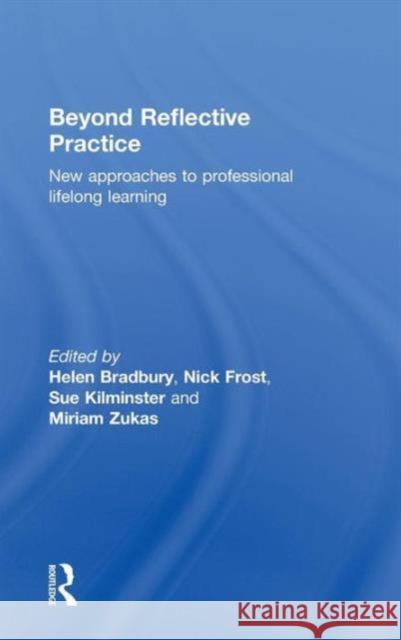Beyond Reflective Practice: New Approaches to Professional Lifelong Learning » książka
Beyond Reflective Practice: New Approaches to Professional Lifelong Learning
ISBN-13: 9780415467926 / Angielski / Twarda / 2009 / 230 str.
Beyond Reflective Practice: New Approaches to Professional Lifelong Learning
ISBN-13: 9780415467926 / Angielski / Twarda / 2009 / 230 str.
(netto: 638,30 VAT: 5%)
Najniższa cena z 30 dni: 579,30
ok. 30 dni roboczych.
Darmowa dostawa!
Reflective practice has moved from the margins to the mainstream of professional education. However, in this process, its radical potential has been subsumed by individualistic, rather than situated, understandings of practice. Presenting critical perspectives that challenge the current paradigm, this book aims to move beyond reflective practice. It proposes new conceptualisations and offers fresh approaches relevant across professions. Contributors include both academics and practitioners concerned with the training and development of professionals. Definitions of reflection (which are often implicit) often focus on the individual's internal thought processes and responsibility for their actions. The individual - what they did/thought/felt - is emphasised with little recognition of context, power dynamics or ideological challenge. This book presents the work of practitioners, educators, academics and researchers who see this as problematic and are moving towards a more critical approach to reflective practice. With an overview from the editors and fourteen chapters considering new conceptualisations, professional perspectives and new practices, Beyond Reflective Practice examines what new forms of professional reflective practice are emerging. It examines in particular the relationships between reflective practitioners and those upon whom they practise. It looks at the ways in which the world of professional work has changed and the ways in which professional practice needs to change to meet the needs of this new world. It will be relevant for those concerned with initial and ongoing professional learning, both in work and in educational contexts.
‘Reflective practice’ - and evidence of it in portfolios, learning logs and other forms of assessment - is now a necessary part of professional education at both undergraduate and postgraduate levels. In some professions it is also part of, or being considered as a vehicle for, continuing professional development and re-certification and revalidation processes. The work of Donald Schön has been influential in supporting this thoughtful basis for reflecting on the complexity of the professional world but that world has now changed.
In this book the authors move ‘beyond reflective practice’ and begin by explaining why new ways of thinking about reflection are now essential. With an overview from the editors and fifteen chapters considering new conceptualisations, professional perspectives and new practices, the individual authors examine what new forms of professional reflective practice are emerging. In particular, they examine the relationships between reflective practitioners and those upon whom they practice; they look at the ways in which the world of professional work has changed and the ways in which professional practice needs to change to meet the needs of this new world. In addition the editors provide a conclusion that bring together the main themes from the book and suggest practical ways forward for research and practice
With contributions from some of the leading experts in the field of reflective practice, including David Boud, the book provides a thought-provoking look at the way forward in professional development and lifelong learning.











